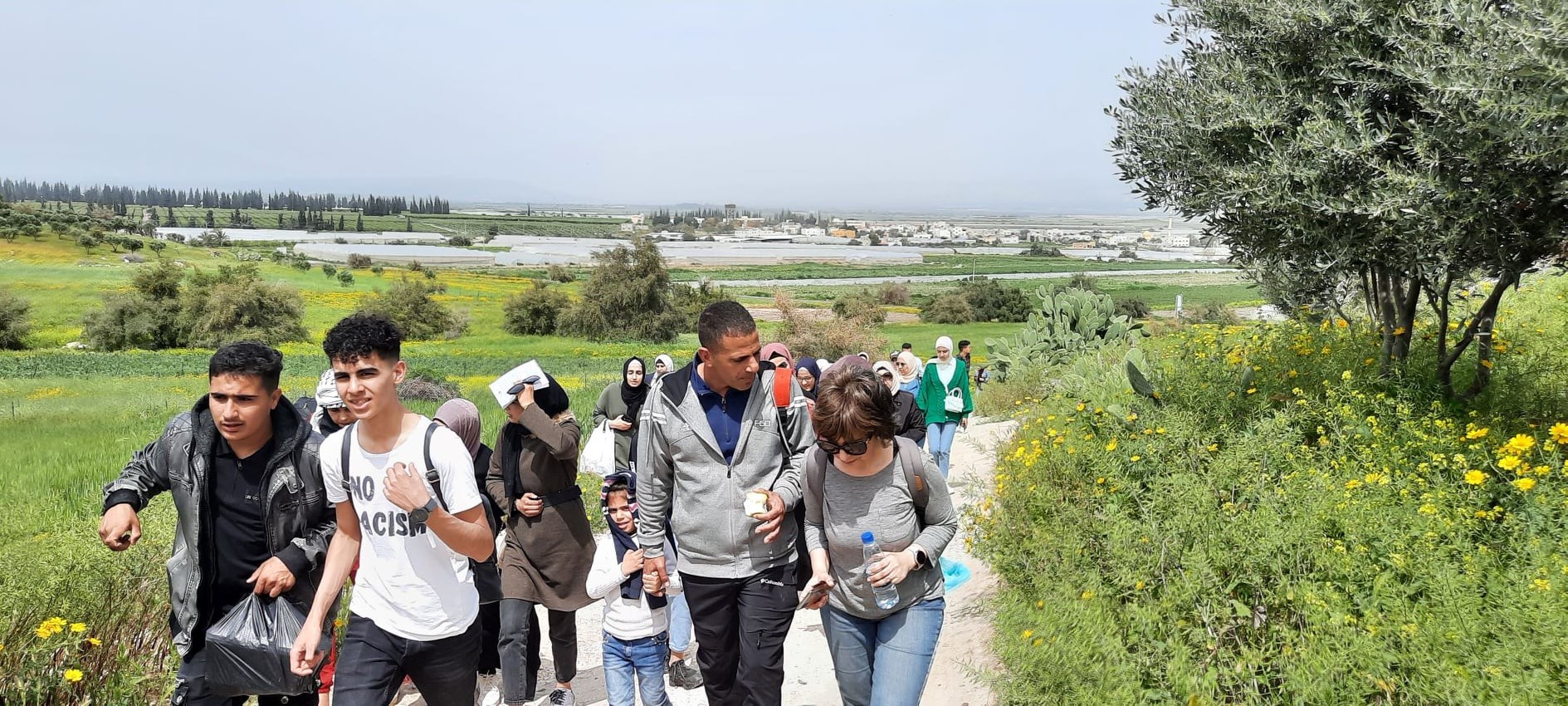The Democracy and Workers’ Rights Center, in coordination with the New Unions Federation – Tubas branch, organized a tour and walk in the Northern Jordan Valley as part of the project “Gender Equality in the Economic Sphere: Our Right, Our Priority”, which is funded by the European Union and which DWRC implements in partnership with the Palestinian Working Woman Society for Development, COSPE and EducAid. The event aimed at highlighting opportunities and challenges that women face in the Northern Jordan Valley in accessing job opportunities without discrimination and exercising the profession of their own choice. Likewise, the organizers of the tour aimed at highlighting the important role of duty bearers, both official institutions and civil society, in empowering women to get decent jobs that guarantee them a decent life. The event included interventions about women’s experiences and the challenges they faced in getting jobs, in addition to introducing participants to the Northern Jordan Valley area and Bardala, its economic activities, and the nature of women’s economic role there, as well as a discussion session about the status of women in the Jordan Valley villages and the challenges they face, and the best strategies to overcome these challenges.
Rashid Khdeir, an activist of the “Save the Jordan Valley” campaign talked about successful experiences in strengthening the resilience of male and female farmers in areas classified (C), through providing support to Palestinian families. He also explained their successful experience in establishing a cooperative for food and agricultural production, which was formed by 15 members (10 men and 5 women). This cooperative has started cultivating a plot of land and marketing food products and soaps to contribute in improving their income. He clarified the series of challenges and complications imposed by the Palestinian Cooperatives Law, which consist in the necessity to open a bank account and deposit a starting capital in order to officially register the cooperative. This constitutes a major obstacle for young men and women, in terms of providing sufficient capital and overcoming banking restrictions. Despite these challenges and obstacles, the cooperative’s members are moving forward with confident steps and a new vision for the economic empowerment of women and youth in the Jordan Valley.
Many participants stressed the need to intensify work with women in the Jordan Valley, especially as they are subjected to serious violations of their economic rights. Mrs. Feryal Daraghmeh and Mrs. Kifah Freihat stated that there are women, who work long hours in agriculture for a daily wage that does not exceed seventy shekels, while male workers obtain a 100 shekels for the same work and under the same conditions. Furthermore, women workers do not obtain paid leaves and vacations, including maternity leave. Firyal also talked about the difficult work conditions of women workers in Israeli settlements, who are denied labour rights, face violations of their wages and ill-treatment, noting that women in Bardala and the Northern Jordan Valley have stopped working in settlements many years ago.
On this topic, Khaled Samara, director of the Labor Ministry Directorate in Tubas, talked about a project that provides alternative jobs for Palestinian women working in Israeli settlements. He asked women workers to cooperate with competent authorities to monitor and document cases of violations to enable them to address them, indicating that female and male workers often abstain from disclosing violations of their rights during personal interviews or through questionnaires.
The tour in Bardala continued with a visit to the Northern Valleys Women’s Center, where the Center’s director, Firyal Sawafta, further explained the difficult situation of workers in this area, which suffers from neglect by official institutions. She said that women lack support, which exacerbates their economic plight and decreases their opportunities to contribute in economic activities. She added that donors set restrictive conditions for financing development programs in the Jordan Valley, which reduces women’s opportunities to benefit from them. She mentioned the example of restrictions related to the age category of beneficiaries, which does not correspond to the ages of women, who have the experience needed for starting their own projects. She went on to say that “residents of the Jordan Valley in general lack knowledge of their rights and the tools necessary to defend these rights. There is a need to design interventions that take into account the needs of women, and the need to implement awareness-raising meetings and capacity-building activities to enhance women's economic contribution and build their capacities to defend their rights”.
Participants then walked to Khirbet Al-Hama, which includes a spring that has been protected and surrounding lands that have been planted and utilised by activists in Bardala and the new cooperative. The tour concluded with music, singing and poetry performed by young women participants, and a discussion on challenges and possible solutions for marketing products made by self-employed women or women’s associations and cooperatives. Views and experiences were exchanged among the participants on this topic.
At the end of the event, participants from outside the Jordan Valley expressed their appreciation for this opportunity to become acquainted with the overall circumstances faced by Palestinians in the Jordan Valley, and women in particular. Participants emphasized the necessity to advocate for official institutions to increase their support for Palestinian farmers in the Jordan Valley, as this area represents the main food basket of Palestinians. Furthermore, participants highlighted the importance of protecting women’s rights in the economic sphere, address violations of their rights and eliminate all forms of discrimination against women.




